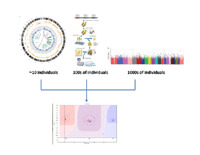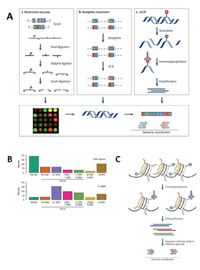Integrated Genomic Technologies
The goal of the Center for Genes, Environment and Health (CGEH) is to discover the etiology, understand the biology, and more effectively diagnose, prognosticate, and treat patients with immune-mediated conditions, infectious diseases, and lung diseases. Central to this objective is the incorporation of high-throughput technologies such as whole genome sequencing or microarrays that interrogate messenger RNA expression (mRNA), microRNA (miRNA) expression, sequence variants, and epigenetic modifications.
The following technologies are in place in the CGEH to facilitate genetics and genomics research in the Center, National Jewish Health, and the University of Colorado Denver in general:
Sequencers and Genomic Platforms
- Illumina HiSeq 2500
- Illumina MiSeq
- Thermo Ion S5 XL (Qty2)
- Thermo Ion PGM
- 10X Genomics Single Cell Platform
- Wafergen Single Cell Platform
Molecular Biology and Supporting Instruments
- Illumia cBot2
- Thermo Ion Chef (Qty3)
- BioAnalyzer (Agilent)
- Fragment Analyzer (AATI)
- QuantStudio 7 - qPCR (Thermo)
- Covaris S2 (Qty2)
- Bead Beater
- Plate Reader
- Sanger Sequencers – 3730XL and 3130 (Thermo)
Genetic Variation

In the area of genetic variation, we are using next generation sequencing and genotyping to identify polymorphisms in lungs of individuals with chronic lung diseases. We are taking several complementary approaches. In one approach, we are sequencing whole genomes of a few individuals to identify polymorphisms and structural variation (insertions, deletions, and inversions). In another approach we are sequencing exomes (all exons in the human genome) of several hundred individuals. In the third approach, we are performing whole genome association studies (GWAS) on thousands of individuals to identify loci that are associated with disease phenotypes. These genome-wide studies are then followed by focused genotyping in independent cohorts to validate the polymorphisms.
Genomic Expression

In the area of genomic expression, we are collecting transcriptional profiles on lung tissue and peripheral blood of individuals with chronic lung disease. We are also using gene expression profiling to investigate transcriptional changes in a variety of murine models of lung diseases we are studying.
Epigenetics
In the area of epigenetics, we are using genome-wide approaches including ChIP-seq, FAIRE-seq, and Methyl-Seq in a variety of projects to study histone modifications, open-chromatin regions, and methylation marks. In one project, epigenetic changes are examined to determine associations with development and progression of complex lung diseases. In other projects, epigenetic profiling provides important clues about the processes determining cell identity and cell fate.
References
- Irizarry RA, Ladd-Acosta C, Wen B, Wu Z, Montano C, Onyango P, Cui H, Gabo K, Rongione M, Webster M, et al. The human colon cancer methylome shows similar hypo- and hypermethylation at conserved tissue-specific cpg island shores. Nat Genet 2009;41:178-186.
- Schones DE, Zhao K. Genome-wide approaches to studying chromatin modifications. Nat Rev Genet 2008;9:179-191.
